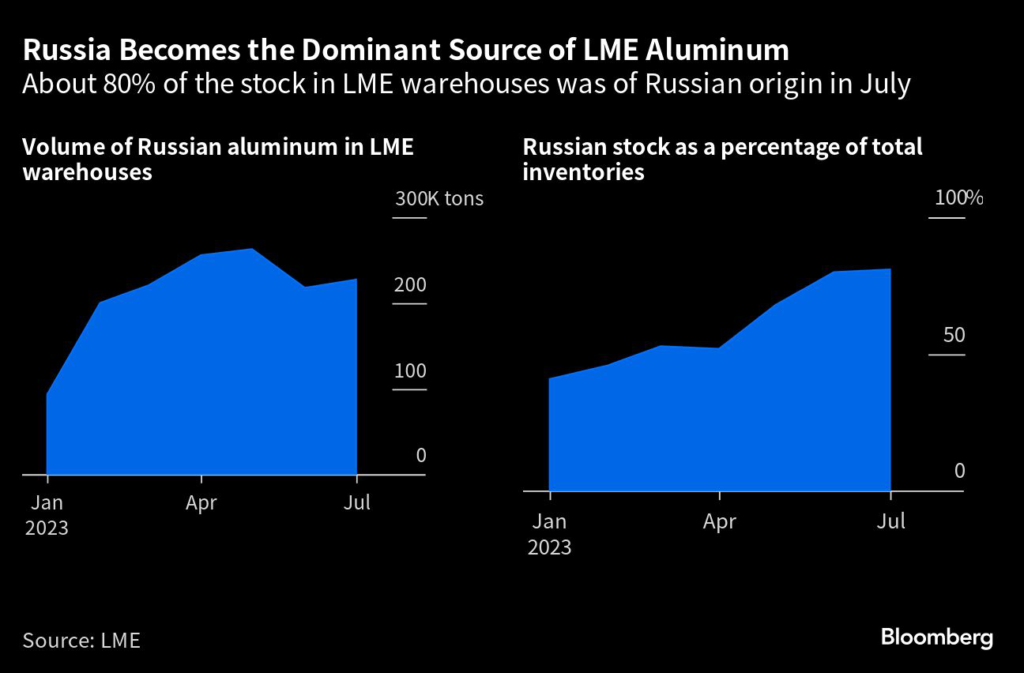Citigroup Inc. has bought about $160 million of Russian aluminum from the London Metal Exchange, something many banks have refused to touch since the invasion of Ukraine.
(Bloomberg) — Citigroup Inc.
has bought about $160 million of Russian aluminum from the London Metal Exchange, something many banks have refused to touch since the invasion of Ukraine.
The US bank was behind requests to deliver about 75,000 tons of aluminum out of warehouses in Gwangyang, South Korea, that were reported by the LME on Friday, according to people familiar with the matter, who asked not to be identified discussing a private matter.
The metal was originally produced by Russia’s United Co. Rusal International PJSC, they said.
There are no blanket sanctions that outlaw trading in Russian aluminum, but it has nonetheless become a politically charged subject in the metals industry following Russia’s invasion of Ukraine last year.
The US in February announced a 200% tariff on imports of Russian aluminum, saying the Russian aluminum industry had “played a major role in supplying Russia with weapons and ammunition used in the war.”
Some buyers and traders of aluminum, which is used across the construction, packaging and transportation industries, have sought to avoid supplies from Russia, either on ethical grounds or because it has become much harder to organize logistics and financing.
And many banks have refused to trade or finance Russian metals since the war began.
Citi itself had been avoiding metal produced by Rusal until recently, according to the people. Alongside competitors like Goldman Sachs Group Inc.
and JPMorgan Chase & Co., Citi is one of a handful of banks that plays a significant role in industrial metals markets.
It’s not clear what Citi intends to do with the metal, or whether it made the trade on its own or is working on behalf of a client.
Aluminum contracts for immediate delivery have recently been trading at the widest discount to later-dated contracts in 15 years, creating an opportunity for traders or banks to earn a guaranteed return by buying and storing metal.
Citi declined to comment.
The role of Russian aluminum on the LME has been the subject of a furious lobbying campaign, with US and European producers arguing that a glut of unsold Rusal metal is distorting prices.
Last year, the exchange considered banning new deliveries of Russian metal but ultimately decided not to.
Since then, Russian aluminum has made up an ever-larger proportion of the exchange’s inventories, accounting for 81% of live stocks at the end of July.
Producers including Alcoa Corp. and Norsk Hydro ASA have recently called on the LME to reconsider the issue.
Some of the banks which continue to trade Russian metal draw the distinction between metal bought directly from Russian producers and metal bought via the London Metal Exchange.
The latter case, they argue, does not involve any financing of Russian entities since payment is made to the LME’s clearinghouse.
Citi’s purchase will bolster the exchange’s argument that Russian aluminum continues to flow out of its warehouses and therefore should still be allowed to be listed on the LME.
“We closely monitor the levels and flow of Russian metal through our physical network, reflecting the behaviors of our underlying market users,” a spokesperson for the exchange said on Friday.
“We note that all metals of Russian origin continue to be consumed by a broad section of the market, and we will remain vigilant in respect of this matter.”
–With assistance from Jack Farchy.
More stories like this are available on bloomberg.com
©2023 Bloomberg L.P.










